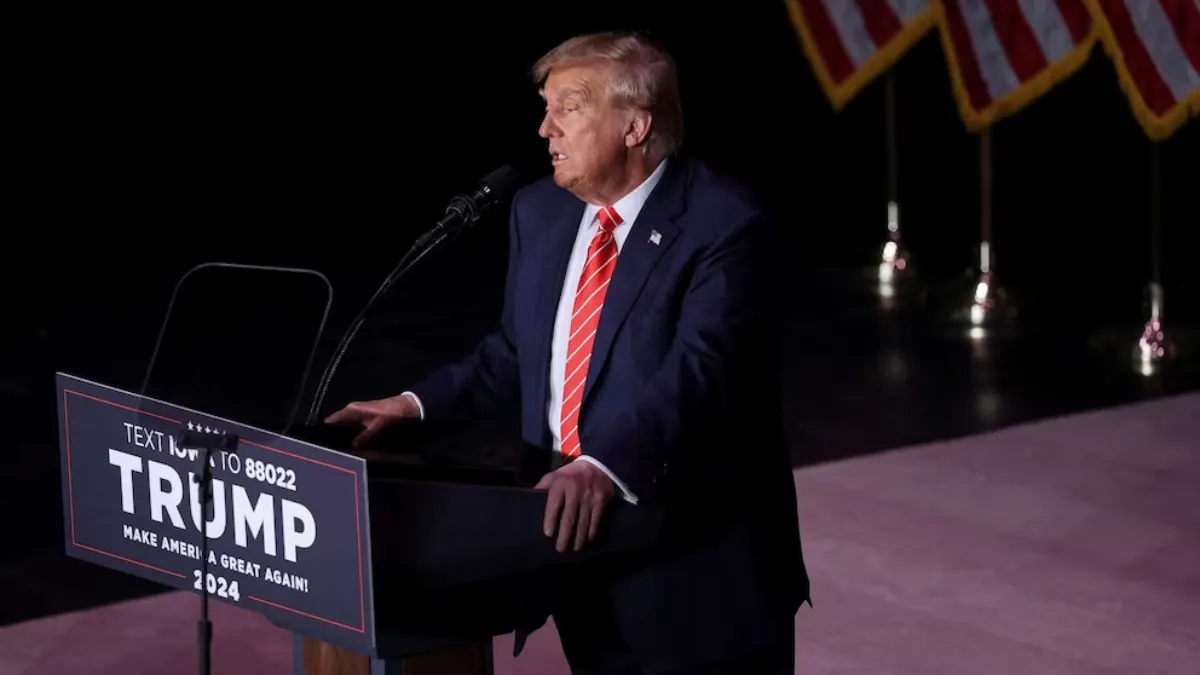According to the attorney spearheading a bipartisan effort to bar former President Donald Trump from the 2024 ballot in all states, it’s highly likely that a prominent court in either Minnesota, Colorado, or Michigan will make a ruling on the matter before the year’s end. This could potentially lead to a pressing review by the U.S. Supreme Court.
According to Ben Clements, the chairman and senior legal advisor of the legal advocacy group Free Speech for People, it is crucial to have a decision on this matter before any ballots are printed. He expressed his hope and expectation that the decision will be in their favor. Free Speech for People has been involved in some of the constitutional challenges against President Trump’s candidacy.
Last week, groups of voters in Colorado and Minnesota presented their cases to judges, arguing that Section 3 of the 14th Amendment of the Constitution prohibits Trump from appearing on their state ballots. This aspect of the Constitution is often disregarded but has become the focus of these cases.
It is anticipated that a preliminary verdict will be issued this month by the Colorado district court. This week, a court in Michigan will consider a case similar to the one against Trump, as his lawyers file a counter-suit against officials in the state in an attempt to include him on the ballot.
During an appearance on ABC’s “This Week,” Clements emphasized the responsibility that falls on the people, secretaries of state, and courts to enforce and interpret Section 3 of the 14th Amendment. Despite any potential political difficulties, Clements stressed the obligation to uphold this crucial provision.
After the Civil War, the 14th Amendment’s Section 3 was ratified to prevent former Confederate rebels from assuming government positions. The section stipulates that individuals who have taken an oath “as an officer of the United States to support the Constitution” and subsequently participated in “insurrection or rebellion” or provided “aid or comfort to the enemy” are ineligible to hold office.
Critics of Trump are accusing him of violating Section 3 due to his involvement in the January 6, 2021, riot at the U.S. Capitol and his attempts to impede the certification of Joe Biden’s election victory.
According to Laurence Tribe, a Harvard Law professor and constitutional scholar, the interpretation of the 14th Amendment in regards to this specific case is straightforward. “It’s very clear cut,” he stated. “The odds are high that a state court will rule in favor of the plain language of the amendment, which is applicable in this obvious situation.”
In court documents, Trump’s legal team has argued that the allegations of his involvement in insurrection are unfounded and that his right to free speech under the First Amendment protects him from such accusations. Trump himself has dismissed the lawsuits as an “absurd conspiracy theory” and labeled them as an attempt at “election interference.”
During a court hearing in Colorado, Scott Gessler, who is representing Donald Trump, argued that the 14th Amendment challenge presented is “anti-democratic”. He further stated that it aims to eliminate the chance for millions of Coloradans, Colorado Republicans, and unaffiliated voters to select and vote for their desired presidential candidate.
Two well-known conservative legal scholars have published an analysis in the University of Pennsylvania Law Review, which has bolstered the constitutional argument for disqualifying Trump. The scholars have concluded that Section 3 is not only valid and enforceable, but also self-executing – and that it applies to Trump.
According to Tribe, being associated with the Federalist Society and not being a liberal like himself actually adds credibility to their work. “The fact that they are associated with the Federalist Society, that, unlike me, they are not liberals, I think adds credibility,” Tribe stated.
According to this theory, each secretary of state possesses the authority to remove Trump from the ballots without any external intervention. This claim is partially supported by a 2012 appeals court decision made by Neil Gorsuch, who is currently a Supreme Court justice and a nominee of Trump himself.
According to Gorsuch, in a case involving a naturalized citizen’s bid for presidency in Colorado, a state can prevent candidates who are constitutionally barred from taking office from being included on the ballot. Gorsuch reasoned that this is necessary to safeguard the integrity and smooth functioning of the political process, which is a legitimate interest of the state.
Section 3 is designed to function regardless of whether or not you are charged and found guilty, according to Tribe’s explanation. To date, none of the secretaries of state have independently enforced Section 3. According to Minnesota Secretary of State Steve Simon, who is a Democrat, any eligibility challenges, including those related to residency or age, must go through the court and no other channel.
According to him, their office is not an investigatory or law enforcement office. He emphasized that the legal decisions about the conduct of individuals and whether it constitutes constitutional disqualification will be made by the court.
According to Sarah Isgur, an ABC News legal analyst and former Trump Justice Department official, the case is a difficult one.
The courts will have to consider whether Jan. 6 qualifies as an ‘insurrection’ or ‘rebellion’ in the legal sense, and whether Donald Trump was actively involved in it. According to Isgur, there is a more challenging issue at hand. Section 3’s language only pertains to individuals who have taken the oath of office as officers of the U.S. When Trump was sworn in as president, he did not take the oath as an officer of the U.S. These are the questions that the courts will have to grapple with.
In Clements’ opinion, his cases present a strong argument that will be hard for the Supreme Court to overlook.
He explained that the intention behind Section 3 was to identify individuals who exhibit behavior that poses a significant threat to our democracy. These individuals, despite having the backing of the majority of Americans, should not hold public office due to their egregious conduct.
Also Read:
- CNN Opinion: The Outcome of this Case Could Pose a Significant Threat to Trumps Presidential Campaign in 2024
- Plea deals in Georgia pose a threat to Trump and his co-defendants
- Police arrest woman attempting to approach Trump at New York trial; she claims to be a supporter



